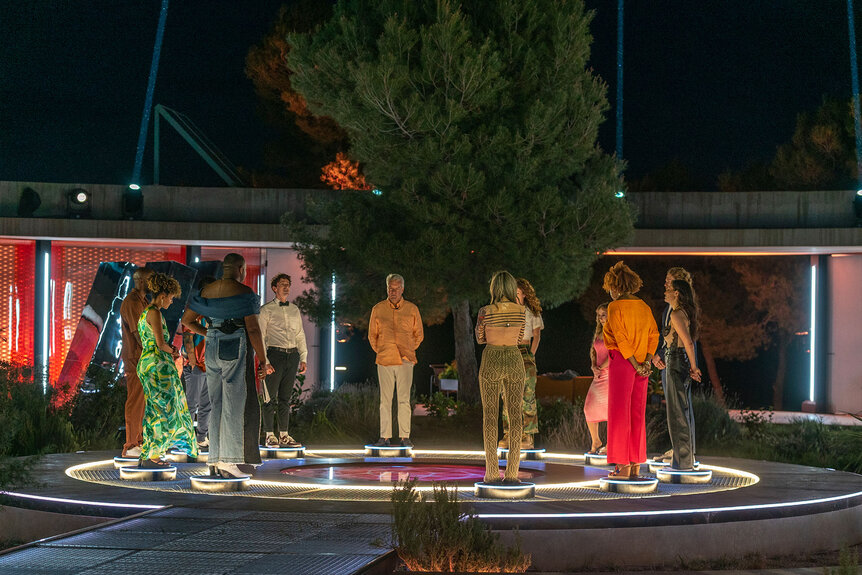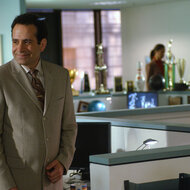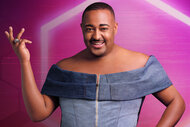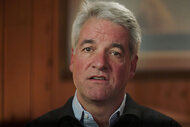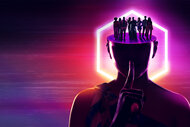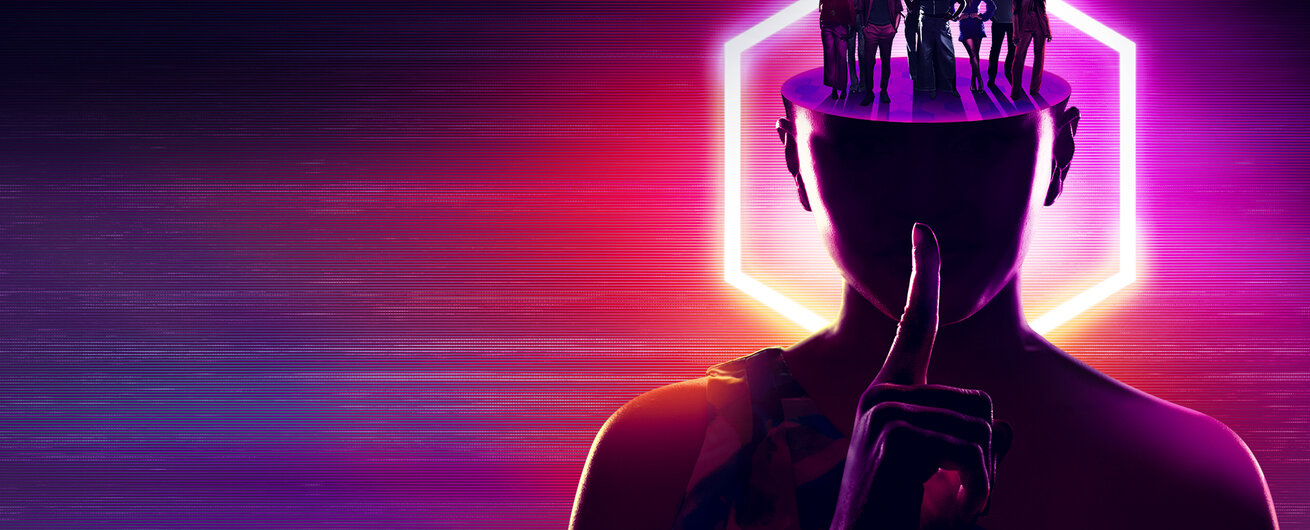Anonymity Brings Out the Worst (and Best) in Us: The Science of The Anonymous
Will being in "Anonymous Mode" encourage players to be their worst selves?

What do a secret hacker collective, an unknown romantic admirer, a celebrated graffiti artist, an ostensibly robotic French musical duo, and author Chuck Tingle have in common? Each of them exists beneath a veil of anonymity that allows them to do the things they do.
When people are "anonymous" their behaviors tend to become more extreme, but not necessarily more vicious. USA Network's reality series The Anonymous puts that idea to the test in a uniquely designed show format that takes place half in the real world and half in an anonymous digital chat room.
Players spend part of the time working together in the real world and part of the time shrouded behind faceless avatars, where their true feelings (or calculated lies) can come to the surface without immediate consequences. The question is: Will they remain friends or will they eat one another alive? What are people more likely to do when given the chance to reap the reward without consequence?
Let's see what the research says ...
The Transformative Power of Being "Anonymous"
Early research into the phenomenon of anonymity focused mostly on the behavior of crowds. When collected in a large group, people undergo an unusual and powerful mental transformation. First, people lose a sense of identity (known as deindividuation) as they fall into the mass of the mob. At the same time, they gain the collective power of the whole. A crowd can therefore behave with an excess of power and a lack of responsibility or accountability.
RELATED: The Anonymous Creators Explain How the Social Competition Series Really Works
A similar sort of trend seems to happen online. If you’ve spent any amount of time in social networking spaces, you’ve probably witnessed a friend or family member who behaves one way in person and another way on the internet. Even on networks with photos and names, the digital distance is enough for people to lose some of their social graces. With all of that in mind, we’re almost guaranteed to see some extreme behavior from The Anonymous players throughout the season.
Whether that behavior is kind and helpful or harsh depends a lot on how they choose to leverage their anonymity.
Author Chuck Tingle is an expert in existing anonymously. He emerged in 2014, publishing bizarre erotica stories online that have been the thing of internet legend ever since. Tingle’s stories (known lovingly as "Tinglers") often involve amorous relationships between humans and mythical creatures, dinosaurs, living objects, and even abstract ideas. More recently, Tingle authored a pair of more conventional horror novels titled Camp Damascus and Bury Your Gays, both from Tor Books.
What seems, at first glance, like a ridiculous collection of art, has evolved over the last decade into one of the most open and welcoming communities in literature. Tingle has created a space not only for himself in publishing, but also for other outsiders and “weirdos” who recognize through their shared love of Chuck’s work that they’re not alone. And he did all of that with a pink bag over his head.
“I’m definitely not a 'guilty pleasures' buckaroo,” Tingle told USA Insider. “I just say, ‘Well, that’s just a pleasure.’ I have always thought that the low and high brow are of equal value. But, still, I think with my genuine interest in the type of erotica I was writing, it was very freeing to think, ‘Well, no buckaroos that I know will know that this is my expression.’ So, creatively it really gave me a chance to kind of just express from the pit of my soul in a way that I think social situations might stop someone if they weren’t wearing a mask.”
Like all of us, Tingle’s view of the world is colored by his own experiences and perspective. He’s on the autism spectrum, bisexual, and before donning the mask, he suffered from chronic pain. Ever since he started presenting publicly from behind a pink bag, all of that pain went away.
“It was like going to physical therapy, my body, that tightness that I always carried was drifting away. Over time, over the years, it was this mystery illness that I had, this intense pain and tightness that was basically cured by letting me have this steam valve where I could wear a physical mask, a pink bag, and then allow myself to stop neurotypically masking and it just worked wonders,” Tingle said.
In anonymous environments, framing and priming matter in terms of defining group identity. In experiments, anonymous groups behaved helpfully with more “human-oriented” solutions when they were primed with helpful ideas. If they were primed with more negative thoughts, they responded more aggressively and with less helpful solutions.
Groups naturally develop norms that determine what behavior is acceptable, even when everyone is anonymous. It’s the reason that some online forums can become entirely toxic while others remain wholesome.
You might expect, looking at the not-safe-for-work nature of Tingle’s books, that the norms of his community would trend toward the chaotic, but you’d be wrong. Instead, "Buckaroos" (the name Tingle gives to fans, and what he calls people in general) celebrate love and acceptance in all its forms, even and especially when those forms are unusual.
In anonymous spaces, we have to remember not to feed the trolls, but we also have to remember that there’s more to the story. In one study, participants were more likely to cheat in a darkened room but they were also more likely to tell someone if their zipper was undone or they had food in their teeth. Even a low level of obscurity made them more comfortable helping out in a potentially embarrassing situation.
Likewise, people are more likely to share personal information or secrets when their identity is obscured, which is one reason that online relationships can be just as strong as in-person ones. The research suggests that, generally speaking, there are two main reasons for seeking anonymity: toxic behavior and self-expression. The trick is to aim your anonymous self in the right direction.
“The mask is a tool. And like all tools, it can be used in various ways. It can be used for good, and it can be used for not-so-good. I personally believe that humans in general, the vast majority, [the] overwhelming majority, are good. And there's a very small percentage of bad buckaroos out there. So, I do think that the idea of being anonymous ultimately is more useful than not,” Tingle said. “If there's buckaroos on an anonymous forum posting all of these terrible things, part of me thinks a lot of what they are doing there is exploring this darkness in a way that they believe — because they are anonymous — that it's not hurting anyone. The truth is, it is. That does bleed into the real world. When you are wearing the mask, the things you do are still interacting with reality. I think that really the caution is in how you use that tool. It is not a playground without consequences. My advice would be to remember that and understand it.”
So as the players on The Anonymous continue to explore the consequences of their actions both in person and in anonymous mode from week to week, we'll see which sides win. Will their better angels win out, or will they discover new levels of personal ruthlessness to get what they want?
Watch all-new episodes of The Anonymous on Mondays at 11 p.m. ET/PT on USA Network.
